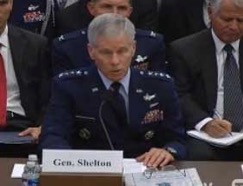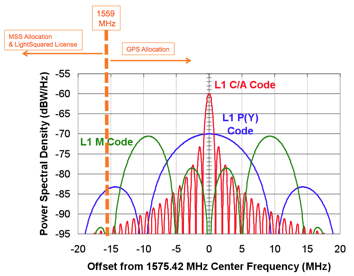Gen. Shelton in the News Again on GPS/LightSquared

The hearing got off on an odd note with this statement by the committee chair:
That said, I have the unfortunate responsibility to inform the subcommittee that Federal Communications Commission (FCC) Chairman Genachowski refused to appear today. I must also make clear that I consider the Chairman’s failure to show up today to be an affront to the House Armed Services Committee.
Throughout the hearing there was endless ambiguity over whether the GPS receivers possibly threatened by the LightSquared system were military systems or private sector systems. Shelton stated at the hearing:
“Based on the test results and analysis to date, the LightSquared network would effectively jam vital GPS receivers. And to our knowledge thus far, there are no mitigation options that would be effective in eliminating interference to essential GPS services in the United States.”
FoxNews added to the confusion by stating:
The Virginia-based satellite and broadband communications company has plans to build a nationwide, next-generation, 4G phone network that many, including Shelton, think would seriously hinder the effectiveness of high-precision GPS receiver systems, a product used most commonly by the United States military.
A former high level GPS program official recently pointed out to me that the alleged threat to military GPS users is truly bizarre. The proposed terrestrial base stations now are 20 MHz outside the GPS band and are of modest power. A US adversary of even modest means would be capable of building GPS jammers closer to or within the GPS band and with a power much higher than what LightSquared is planning for its terrestrial network.
The Washington Post reported,
“But the new plan, Shelton said, will require billions of dollars in fresh testing of antennas and receivers that could take as long as a decade.”(emphasis added)
Furthermore, such an adversary could also chose a jamming signal more optimized for GPS disruption than the LTE signal proposed by LightSquared. Is this all it takes to disrupt the military’s multibillion dollar critical investment in GPS that is so critical to our national security? If so, there is an urgent problem at hand and it is not just the LightSquared issue, it is the extreme fragility of military GPS systems! More likely, however, is that the proposed system will have no impact on military users but that the whole GPS community is “circling the wagons” in an “all for one, one for all” strategy to protect a few GPS manufacturers who made odd design decisions in their receivers, such as the Deere receiver whose front end covers 3 bands: MSS, GPS, and GLONASS. A strong signal in any of these bands then blocks the receiver.
There was repeated discussion at the hearing of the need for precision GPS receivers to receive “GPS harmonics” for optimal performance. As a service to readers, here is a repeat of the spectrum GPS uses:

There is some GPS signal power outside the allocated L1 spectrum that ends at 1559 MHz, but not 20 MHz away! At a previous hearing before the House Science Committee, US Geological Survey complained about impact of LightSquared base stations on plate tectonic monitoring receivers. USGS was vague about the bandwidth of this receivers, but it is reported that it is significantly greater than the bandwidth of any usable part of the GPS signal.
Perhaps as indication that the hearing was orchestrated by a PR agency working for commercial GPS interests, it even went into a recent ad by LightSquared in Politico . No mention was made of unreasonable alarmist statements by GPS interests. It became apparent during UWB deliberations that the GPS industry and FAA had a codependency and were willing to do policy favors for each other. Hence FAA took the lead trying to block UWB even though even NTIA readily agreed that none of the UWB emission levels under consideration at the time posed a risk to aviation uses of GPS. Now it looks like Gen. Shelton has slid into the FAA’s former role as defender of GPS commercial interests, this time by blurring the distinction between military uses and commercial uses.
Do we really need this type of codependency?
Prepared Statements
Complete Video of 9/15/11 Hearing



![Validate my RSS feed [Valid RSS]](valid-rss-rogers.png)

